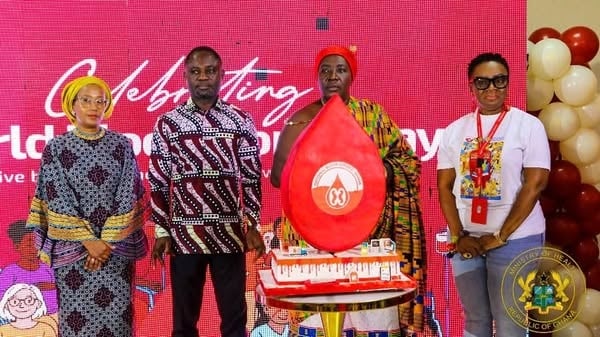Ghana marked World Blood Donor Day 2025 with a resounding call for increased voluntary blood donations, emphasizing the theme “Give Blood, Give Hope: Together We Save Lives.” This year’s commemoration served as a platform to express gratitude to the selfless individuals whose donations form the bedrock of the nation’s healthcare system, while simultaneously highlighting the critical need for more Ghanaians, particularly the youth, to embrace regular blood donation as a civic responsibility. The event underscored the importance of blood donation in saving lives and ensuring a robust healthcare system.
Health Minister Kwabena Mintah Akandoh highlighted the crucial role of blood safety and accessibility within the “Mahama Cares” healthcare reform agenda. He announced a potential policy shift involving the elimination of blood processing fees, a move aimed at alleviating the financial burden on patients requiring transfusions. This proposed change underscores the government’s commitment to ensuring equitable access to life-saving blood products. The Minister’s call to action urged citizens between 17 and 60 years of age to integrate regular blood donation into their personal contributions to national health, furthering the message that access to safe blood is a fundamental right. He also challenged organizations in both the public and private sectors to actively promote blood donation by organizing at least two drives annually.
Dr. Shirley Owusu-Ofori, CEO of the National Blood Service, presented a mixed picture of the nation’s blood supply status. She celebrated the remarkable achievement of collecting 187,280 units of blood in 2024, representing 99% of the national target. Furthermore, over 45,000 units were processed into components, catering to a diverse range of clinical needs. This accomplishment underscores the effectiveness of existing efforts and the dedication of healthcare professionals. However, she also candidly addressed persistent operational challenges, including significant infrastructure limitations, a chronic shortage of mobile blood collection units, and inadequate investment in a comprehensive digital Blood Information Management System. These challenges represent critical bottlenecks that hinder the efficiency and effectiveness of the national blood supply network.
To address these infrastructural and logistical shortcomings, Dr. Owusu-Ofori advocated for the establishment of Regional Blood Centres and the implementation of a fully resourced National Blood Donor Programme. These strategic investments are crucial for strengthening the long-term resilience of Ghana’s blood supply network and ensuring its ability to meet the growing demand for safe blood. She emphasized the importance of a coordinated and well-funded approach to blood donation, highlighting the need for investments in infrastructure, technology, and human resources.
The commemoration of World Blood Donor Day 2025 will extend beyond the official event, with nationwide blood donation drives, public education campaigns, and media outreach initiatives designed to raise awareness and encourage more Ghanaians to become regular donors. These activities aim to create a sustained momentum for blood donation, fostering a culture of voluntary giving within the community. The overarching goal is to transform blood donation from a sporadic act of generosity into a regular, life-saving habit.
Dr. Owusu-Ofori concluded her remarks with a powerful appeal – “Be a lifesaver. Show off your arm!” – a concise and evocative message encapsulating the essence of the occasion. This simple yet profound statement serves as a reminder that every unit of donated blood holds the potential to be a lifeline for someone in need, contributing not only to individual well-being but also to the collective health and compassion of the nation. The slogan serves as both a call to action and a symbol of solidarity, encouraging Ghanaians to actively participate in building a healthier and more caring society. The call to “show off your arm” transforms the act of blood donation into a badge of honor, a visible demonstration of civic responsibility and commitment to saving lives. This multifaceted approach – celebrating achievements, addressing challenges, and promoting a culture of voluntary blood donation – underscores Ghana’s commitment to strengthening its healthcare system and ensuring access to safe and readily available blood for all citizens.














